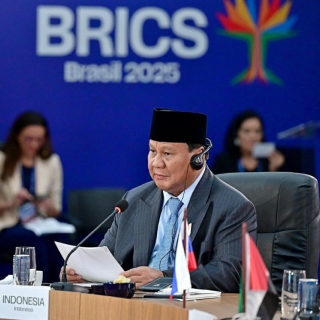


The 17th annual BRICS meeting in Rio de Janeiro lasted for two days and officially closed yesterday. Attended by representatives from 11 full member countries, this meeting confirmed BRICS' position as a new geopolitical power that dares to challenge the dominance of Western global institutions and pressure from the United States, especially under the leadership of Donald Trump.
This year's meeting is an important moment for BRICS with the presence of Indonesia as a full member, along with Brazil, Russia, India, China, South Africa, Egypt, Ethiopia, Iran, and the United Arab Emirates. BRICS now officially represents more than 45% of the world's population and around 35% of global GDP based on PPP. In addition, dozens of partner countries such as Nigeria, Thailand, and Malaysia are present as observers and prospective BRICS+ partners.
US President Donald Trump, in a statement ahead of the meeting, threatened to impose an additional 10% tariff on products from BRICS countries which he called "anti-American." This threat was met with a firm stance from BRICS leaders.
Brazilian President Luiz Inácio Lula da Silva responded to Trump's statement by saying that "The world has changed. We don't need an emperor. We need fair trade and an equal global order."
Yesterday's BRICS meeting made several conclusions, including:
Multilateralism & Global Reform
Financial and Technology Cooperation
Example: If India buys oil from Russia, India can pay directly in rupees, and Russia receives it in rubles — without having to go through USD first.
The main objectives: Reduce USD dominance in the global financial system, Strengthen the economic sovereignty of each country, Accelerate & facilitate transactions between BRICS countries, Protect from the risk of sanctions or US dollar fluctuations
The 2025 BRICS meeting is an important milestone in the direction of a multipolar world. Not only as an economic forum, BRICS is now taking an active geopolitical position in voicing reform of the global system, economic sovereignty, and the balance of world power.
Threats from the West—including tariff pressure from President Trump—have actually strengthened internal solidarity and accelerated the transition to a new, more inclusive and equitable order. The question now is: is the world ready to accept that global power is no longer concentrated in one block. (mrv)
Source: Newsmaker.id
President Donald Trump said Wednesday he plans to send a single letter to over 150 countries outlining the tariff rate they will face, saying, "It's all going to be the same for everyone, for that gro...
The U.S. central bank will probably need to leave interest rates where they are for a while longer to ensure inflation stays low in the face of upward pressure from the Trump administration's tariffs,...
US President Donald Trump plans to impose tariffs of over 10% on smaller countries, including nations in Africa and the Caribbean, as the Associated Press reported. "We'll probably set one tariff for...
President Donald Trump warned on Monday that he would impose secondary tariffs of 100% on Russia if a peace deal with Ukraine isn't reached within 50 days. "We are going to be doing very severe tariff...
The European Union announced on Sunday that it will extend its suspension of countermeasures to U.S. tariffs until early August, aiming to pursue a negotiated settlement. This comes after President T...
Gold steadied and was set for a moderate weekly loss as investors assessed the outlook for Federal Reserve rate cuts after resilient US jobs and retail data eased concerns about the economy. Bullion traded below $3,340 an ounce, heading for a 0.5%...
The USD/CHF pair tumbles to around 0.8030 during the early European session on Friday. Persistent trade tensions and Federal Reserve (Fed) policy uncertainty boost the safe-haven demand, supporting the Swiss Franc (CHF). The preliminary reading of...
Oil headed for a back-to-back daily gain after US data showed the world's largest economy holding up despite the fallout from the Washington-led trade war, while market metrics pointed to near-term tightness. Global benchmark Brent rose toward $70...
 U.S. consumer prices increased by the most in five months in June amid higher costs for some goods, suggesting tariffs were starting to have an...
U.S. consumer prices increased by the most in five months in June amid higher costs for some goods, suggesting tariffs were starting to have an...
 European stocks erased early gains and closed mostly lower on Tuesday as markets continued to assess how potential tariffs from the US may hurt...
European stocks erased early gains and closed mostly lower on Tuesday as markets continued to assess how potential tariffs from the US may hurt...
 The U.S. central bank will probably need to leave interest rates where they are for a while longer to ensure inflation stays low in the face of...
The U.S. central bank will probably need to leave interest rates where they are for a while longer to ensure inflation stays low in the face of...
 President Donald Trump's renewed calls for Federal Reserve Chair Jerome Powell's resignation have prompted investors to protect portfolios against...
President Donald Trump's renewed calls for Federal Reserve Chair Jerome Powell's resignation have prompted investors to protect portfolios against...